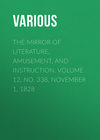Read the book: «The Mirror of Literature, Amusement, and Instruction. Volume 12, No. 338, November 1, 1828», page 6
One spot with which the heart associates
Holy remembrances of child or friend,
Or gentle maid, our first and early love,
Or father, or the venerable name
Of our adored country. O thou Queen,
Thou delegated Deity of Earth,
Oh "dear, dear" England, how my longing eyes
Turned westward, shaping in the steady clouds
Thy sands and high white cliffs! Sweet native isle,
This heart was proud, yea, mine eyes swam with tears
To think of thee; and all the goodly view
From sovran Brocken, woods and woody hills
Floated away, like a departing dream,
Feeble and dim.
Amulet for 1829
We wish a few more of the tourists who are picking their way over the continent, would illustrate their books of travels with such noble sentiments as are contained in these few lines—instead of the querulous whinings about cheap and dear living, the miseries of our climate, and a thousand other ills of the malade imaginaire.
Madame De Souza used to say that "cleanliness is the excellence of the poor."
The Gatherer
A snapper up of unconsidered trifles.
Shakspeare
RUSSIA AND TURKEY
(To the Editor of the Mirror.)
The following intelligence from the seat of war, though premature in some respects, and not quite new in others, may be acceptable to your readers, from A.A.A.
ALPHABETICAL ALLITERATION
An awful army, artfully array'd,
Boldly by battery besieg'd Belgrade;
Cossack commanders cannonading come,
Dealing destruction's devastating doom,
Every endeavour engineers essay,
For fame, for fortune, forming furious fray.
Gaunt gunners grapple, giving gashes good,
Heaves high his head heroic hardihood;
Ibraham, Islam, Ismael, imps in ill,
Jostle John Jarovlitz, Jem, Joe, Jack, Jill.
Kick kindling Kutusoff, king's kinsmen kill;
Labour low levels loftiest, longest lines,
Men march 'mid moles, 'mid mounds, 'mid murd'rous mines.
Now nightfall's near, now needful nature nods,
Oppos'd, opposing, overcoming odds.
Poor peasants, partly purchas'd, partly press'd,
Quite quaking, "Quarter!—quarter!" quickly 'quest.
Reason returns, recalls redundant rage,
Saves sinking soldiers, softens signiors sage.
Truce, Turkey, truce! truce, treach'rous Tartar train!
Unwise, unjust, unmerciful ukraine!
Vanish, vile vengeance! vanish, victory vain!
Wisdom wails war—wails warring words. What were
Xerxes, Xantippe, Ximenes, Xavier?
Yet, Yassy's youth, ye yield your youthful yest,
Zealously, zanies, zealously, zeal's zest.
Ye learned, pray say, who dark mysteries unfold,
Why razors cut better with hot water than cold.
Every kind of knife or razor is a fine saw, though we cannot possibly see it with the naked eye; and on all the edges of those fine polished tools there sticks a kind of resinous substance, which, when put into warm water, takes off the same, and makes the razor cut more easy and free.
A father had three sons, in whose company he was walking when an old enemy of his came running out of an ambush, and inflicted a severe wound upon him before any of the bystanders could interfere. The eldest son pursued the assassin, the second bound up his father's wound, and the third swooned away. Which of the sons loved his father best?
MRS. BILLINGTON
At a rehearsal of As You Like It, Mrs. Billington, who sustained the principal female character, called out in a very peremptory manner, "Fellow, bring me my crook." Mr. Simmonds, the property-man, immediately replied, "Madam, your fellow is not here." She felt the rebuke, and made the request more successfully in more proper language; thus by hook or by crook obtaining it.
Cato the Censor only repented of three things during his life—to have gone by sea when he could go by land, to have passed a day inactive, and to have told a secret to his wife.
"GONE TO JERICHO."
Tradition says that there is more than one place in the county of Essex to which Henry VIII. used occasionally to retire with his mistresses. One of these was Blackmore, at some distance from Shenfield. The manor-house of Blackmore is called Jericho; so when Harry chose to retire with his mistresses, the cant phrase among the courtiers was, "He was gone to Jericho." Hence this proverb or saying.
HALBERT H
HUMBLE, OR UMBLE PIE
The shanks and feet of a buck being called umbles, were formerly made into a pie for the retainers or feudal servants. Hence arose the old saying of "You shall eat humble pie."
HALBERT H
Says Tom, "Your lass look'd like a winter's day,
When last I saw her with the Misses Flirty."
"Indeed, you're merry, but tell me pray?"
"Why, then," quoth Tom, "she was both short and dirty."
W.G—y
Printed and Published by J. LIMBIRD 143, Strand, (near Somerset House,) London: sold by ERNEST FLEISCHER, 626, New Market, Leipsic; and by all Newsmen and Booksellers.










